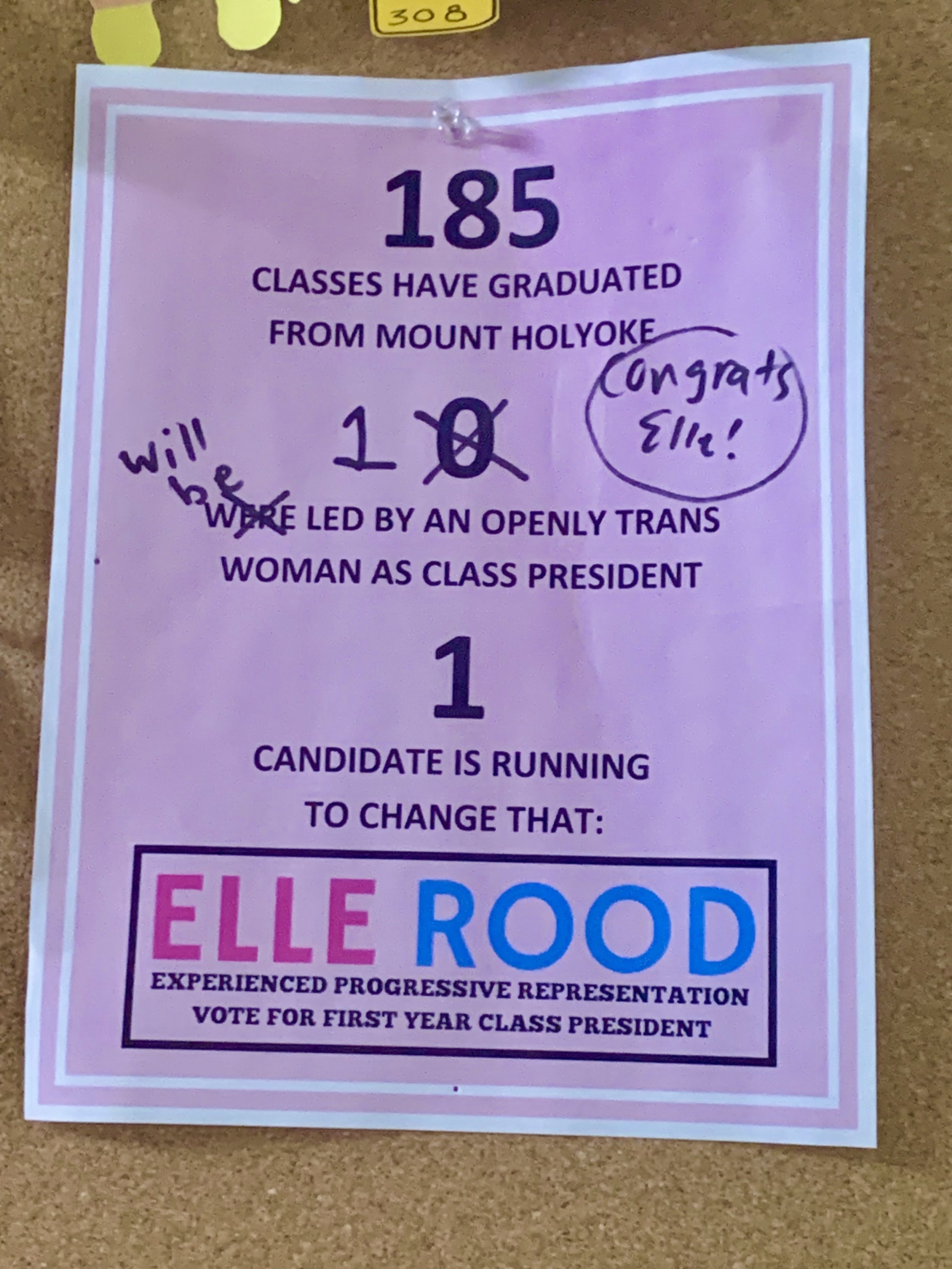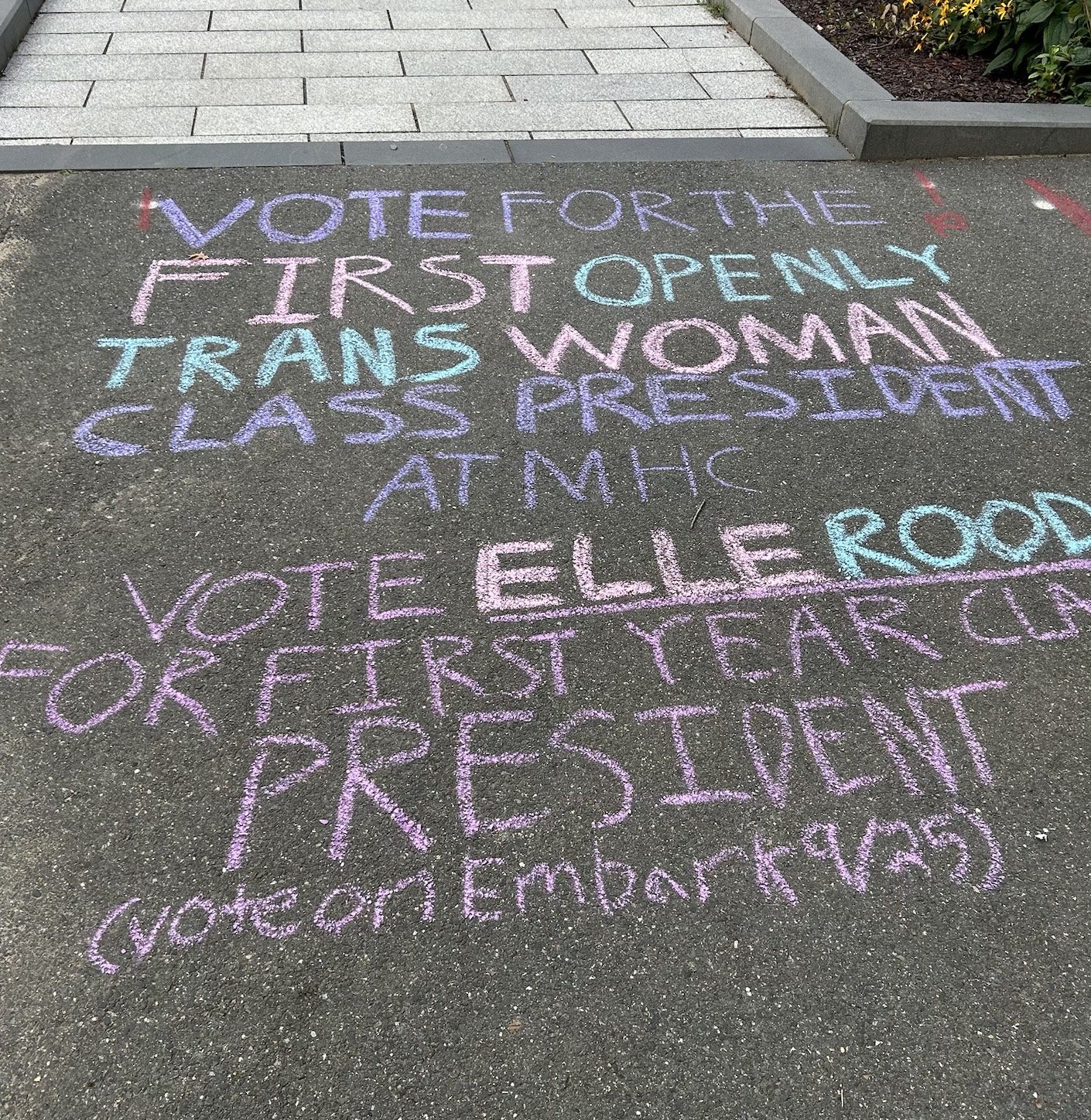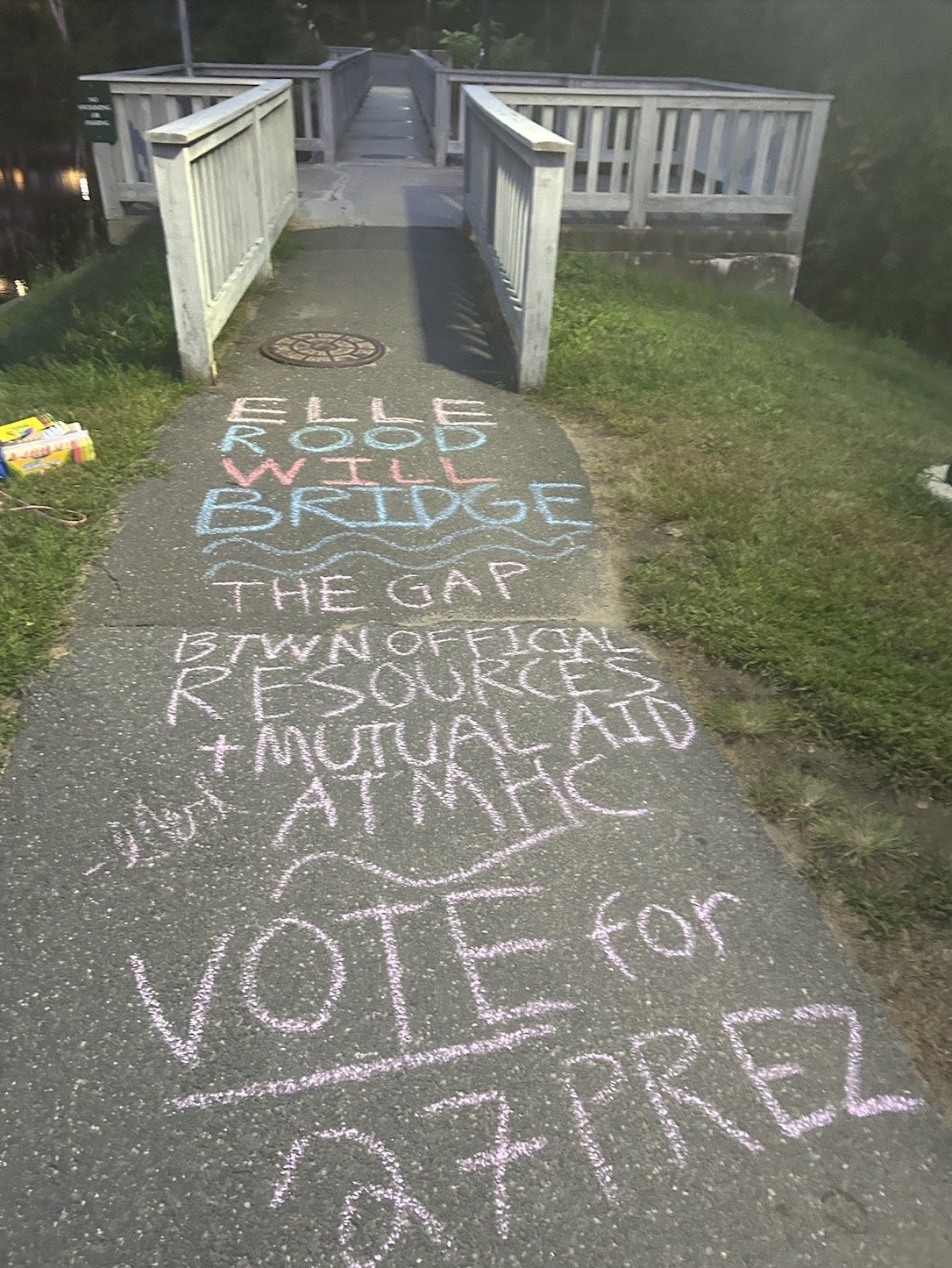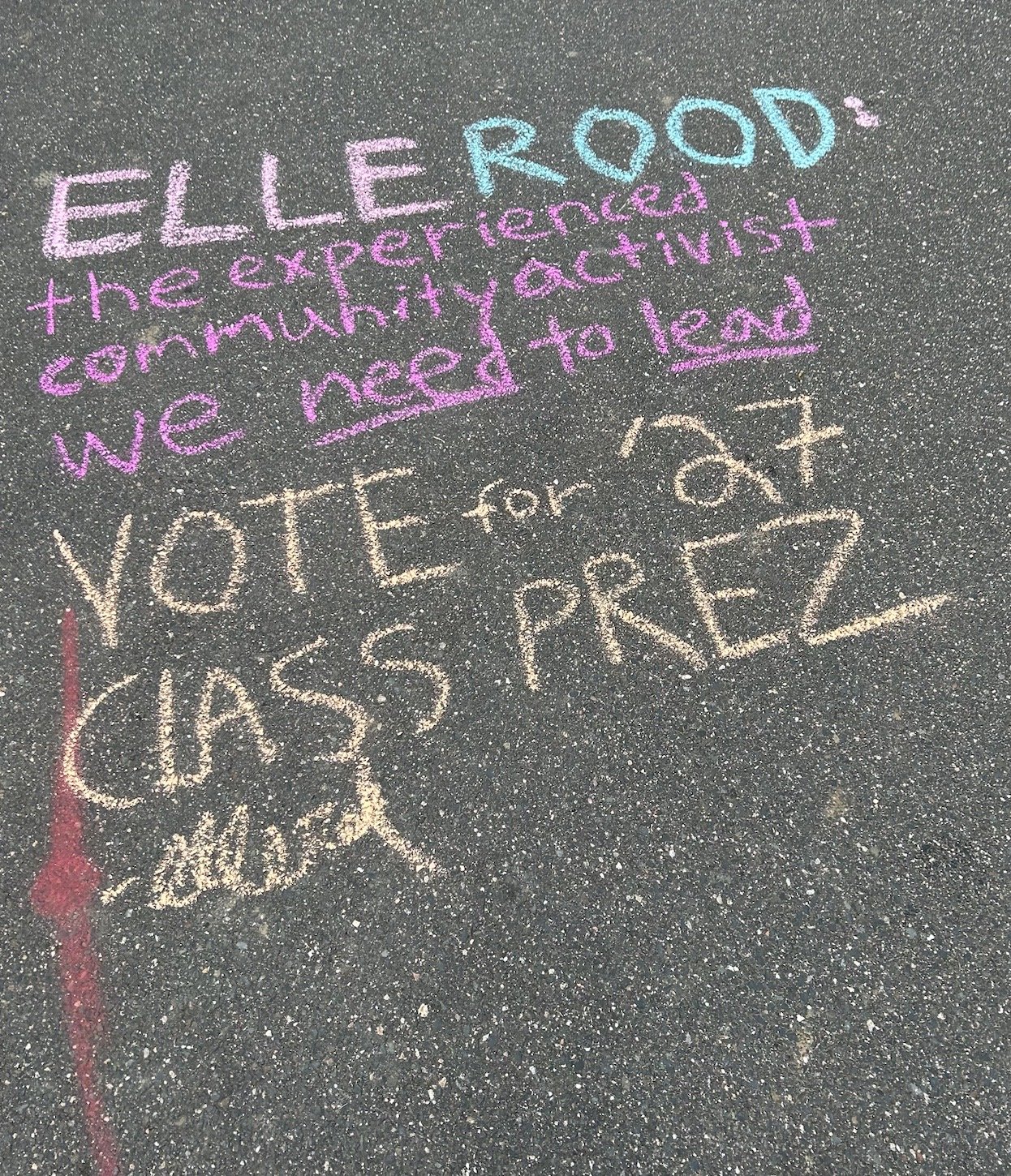Photo by Emma Quirk ‘26. Lily Rood ‘27 would like to bring “Experienced Progressive Representation” to the class of 2027.
By Nyx Cieprisz ’26 & Melanie Duronio ’26
News Editor | Features Editor
After running a successful campaign that connected with the student body’s desire for progress, Lily Rood ’27 was elected president of the Class of 2027 earlier this month.
With a wealth of political experience and a desire for change, Rood sees her presidency as “aligning [her] passions of politics and political organizing with [her] purpose of advancing social justice causes.”
In a recent interview with Mount Holyoke News, Rood discussed her experiences in politics, the importance of representation as the first transgender woman elected as president of a class at Mount Holyoke College, her goals to center civic engagement and community care at the College and her desire to work directly with other students.
“I decided to run for President based on my belief that I could bring ‘Experienced Progressive Representation’ — my motto and my goal — to our class,” Rood said. “I knew I had the experience necessary for success, the progressive values necessary to do socially just work in our community, and the representative abilities needed to demonstrate diverse, equitable leadership.”
The 2016 presidential election sparked Rood’s interest in politics. She remembers listening to NPR and reading The New York Times, finding them “fascinating” and trying to “take in as much information as [she] could.” From there, she conducted her own research on the politicians and policies that spoke to her. She considers herself “a big Bernie fan” and prefers progressive candidates like Elizabeth Warren.
With this newfound interest, Rood hosted a “politics show” on her local community access television station WinCAM. There, she interviewed state representatives and senators, including Rep. Michael Day and Sen. Jason Lewis of Massachusetts.
“It wasn’t my best work, but I was learning. And I did … surprise them with some substantive questions,” Rood said. “I asked a very specific question about … zoning for affordable housing, and I think they weren’t quite prepared to have to answer [that] to an 11-year-old.”
When she moved to New Jersey, she became involved in local politics there. She volunteered for Rep. Andy Kim’s campaign in 2018 and worked as a youth organizer for Andrew Yang’s 2020 presidential campaign. Although she states that she “no longer support[s] Andrew Yang,” his campaign gave her the opportunity to learn political advocacy and organization skills.
During the COVID-19 pandemic, she also served as a national voter contact director for Mike Broihier, a progressive candidate from Kentucky who ran for the U.S. Senate. She worked with the platform NGP VAN, a “core software apparatus for all democratic political organizing,” which helped her to further develop her skills.
“Political organizing is one of the most effective vehicles for social change in our country. So, I got involved in all of this work with a goal of making as much of an impact as I could on social justice causes,” Rood said. “I believe that everyone deserves a right and access to health care, to food security, to housing, to basic human rights. And I don’t believe that that is currently the case in our country. I believe political organizing is one way to advance that cause, so I wanted to continue working on that.”
In her local New Jersey community, Rood found that her town’s Board of Education “had a really significant impact” and “significant economic power.” School districts often hold public governance and, in terms of politics, have the power to impact their local communities. She became appointed as her school’s student representative for the Board and “really took to heart” her duties as a non-voting member.
“[Whenever] there was a discussion of anything, from a budget to different policy issues, I would participate in that discussion [and] ask questions [to] the other Board members,” Rood said. “I don’t think that was necessarily conventional, but I think it was appreciated by the Board members, and I was able to make an impact in that way.”
As student representative, Rood came to understand the importance of representation. She consistently raised awareness of DEI issues by “being a voice on the Board, push[ing] back on community rhetoric that was not always in line with diversity, equity and inclusion.”
She felt she was able to “be an LGBTQ+ voice … and really bring that perspective to the table.” Rood believes that in the current political climate, where transgender and LGBTQ+ voices are being suppressed in both the United States and the world, representation matters more than ever.
At Mount Holyoke, Rood believes that representation is especially significant. “Mount Holyoke’s policy of gender diverse admissions has only been around for about 10 years … In 2012, I wouldn’t have necessarily been able to come here. That’s not some past era that we're long removed from; it’s recent, and it’s impactful,” Rood said. “So there is a continued need to increase representation when it is only so recently that equality has emerged.”
Rood considers representation to be important in both direct and indirect ways.
“[H]aving leaders who understand a certain perspective will lead them to advocate for that perspective.” As the first trans woman to serve as class president, Rood hopes to bring a heretofore unrepresented perspective to Mount Holyoke’s student government. Able to identify the lingering issues caused by Mount Holyoke’s historical exclusion of transgender students, she is now in a position to make an impact.
“For the good of the community, I think it’s important [for] a student applying to Mount Holyoke [to] see that we have diverse student leaders, and that may ensure them that they’re coming [in]to a welcoming community or may inspire a student to run next year for student government.” In addition to making tangible change, Rood hopes that the visible inclusion of trans students in prominent positions around campus sends a message that they are welcome at the College.
First photo by Melanie Duronio ‘26. Rood’s campaign poster is hand-edited by a peer to reflect her victory. Remaining photos by Emma Quirk ‘26. Chalk Messages in support of Rood could be seen across campus in the days before the election.
Rood does not only represent trans students in student government but the entire Class of 2027. “[Representation] can also mean going out and hearing from the students that I represent. … So, I have weekly office hours, which is not … required of a class president. But it’s something that I committed to doing and that I am following through on as class president because I believe it’s important,” Rood said.
Rood’s office hours are one aspect of her larger goal of increasing students’ civic engagement “both at and outside of Mount Holyoke.”
The Class of 2027 had a record voter turnout for the election, with 296 out of 588 eligible votes cast. This election marked the first time in five years that a class election had managed to reach quorum.
Rood wants to keep the student body politically involved, and believes that part of that involvement is making herself accessible. “I want to make it a very democratic process where I am open to hear[ing] from anyone and I’m going to advocate for everyone,” Rood explained.
Her vision for politically engaging the student body is not limited to Mount Holyoke’s campus. “I think it’s important that a class as active and engaged in the community as ours … [is] using [our] voice because we have great things to say,” Rood said. She envisions a voter registration drive to help students either request absentee ballots or register in Massachusetts to engage locally.
Rood also aims to implement community care and mutual aid at Mount Holyoke. “I want to use the resources of the institution of the Student Government [Association and] of the class board to support each other and to lift each other up,” she said, citing the chest binder drive organized by SGA president Maille Romulus ’24 last year as an inspiration for the kind of events she plans to hold.
“I think we need more community,” Rood said. She specifically highlighted issues the trans community faces on campus.
“I think we need more spaces also for…queer joy and joy for different communities,” she said. “… [And to] highligh[t] ways that we do have an inclusive community…[and] areas where we have a positive reflection of what the result of that initial advocacy can look like.”
One of Rood’s campaign promises, “activities for action,” also emphasizes the idea of community. “I believe that we can marry the two student government endeavors of having fun activities and taking action for our community,” she explained. She plans to do so by hosting social fundraising events and bringing students together while also raising money to help meet the community’s needs.
Rood has a number of ideas for what she wants to accomplish in the future. Going into politics is one potential career path for the newly-elected class president, but she also sees herself at a nonprofit or working to increase trans representation in the academic sphere. “I want to dedicate my life to social justice causes, and I don’t yet know exactly what that will look like,” she said.
She also sees multiple paths forward for herself and others. “In order to create a socially just world … I think that academics, politics, community work, mutual aid, all of these things have to come together, and no one discipline is going to change the world on its own,” Rood said. “… I think that our advocacy is most effective when our passions align with our purposes. … I wouldn’t have the same ability to make an impact in this role if I wasn’t passionate about it.”
Editor’s Note: At the time of reporting, Lily Rood went by a different first name. This article was updated Aug. 9 at 1:37 p.m. EST to reflect her change in name.





